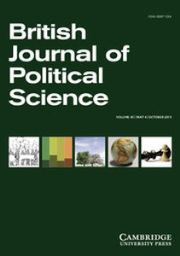Ausgewählte Publikationen
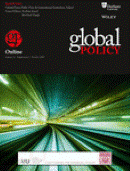 Kruck, Andreas & Zangl, Bernhard (eds.) 2020: Global Power Shifts. How do International Institutions Adjust? Special Issue of Global Policy
Kruck, Andreas & Zangl, Bernhard (eds.) 2020: Global Power Shifts. How do International Institutions Adjust? Special Issue of Global Policy
Shifts in the international distribution of power create an impetus for institutional change. As powers such as China rise and powers such as the US decline, international institutions come under pressure to adapt to new power realities. Yet, the pathways to institutional adaptation vary considerably. What is more, sometimes attempts at institutional adaptation are successful and sometimes they fail. To contribute to a better understanding of such events, this special issue theorizes states and institutions' responses to global power shifts, and provides case studies that explore their attempts to adapt to new realities, gain legitimacy for their actions, cooperate with and see off competitors. Its contributors also discuss the broader implications of their research for the future of the international order and the management of global power shifts.
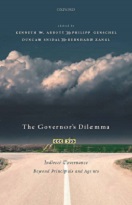 Kenneth W. Abbott, Philipp Genschel,Duncan Snidal und Bernhard Zangl: (eds:2020): The Governor's Dilemma Indirect Governance Beyond Principals and Agents. Oxford: Oxford University Press.
Kenneth W. Abbott, Philipp Genschel,Duncan Snidal und Bernhard Zangl: (eds:2020): The Governor's Dilemma Indirect Governance Beyond Principals and Agents. Oxford: Oxford University Press.
- Challenges the conventional wisdom on indirect governance as encapsulated in the Principal-Agent (PA) model of delegation.
- Analyzes four modes of indirect governance, along with diverse combinations and hybrids, within a single analytical framework.
- Introduces a theory of endogenous change in indirect governance arrangements
- Presents twelve case studies covering both domestic and international governance, including the governance of violence (domestic and international security), the governance of markets (domestic and international political economy), and cross-cutting governance issues.
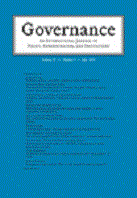 Tim Heinkelmann-Wild & Bernhard Zangl 2020: Multi-level blame games – Blame-shifting in the European Union. In: Governance. Forthcoming.
Tim Heinkelmann-Wild & Bernhard Zangl 2020: Multi-level blame games – Blame-shifting in the European Union. In: Governance. Forthcoming.
Who blames whom in multi-level blame games? Existing research focuses either on policy-makers’ preferences or their opportunities offered by the institutional structures in which policy-makers operate. As these two strands of literature barely refer to each other, in this paper we develop an integrated theoretical model of blame-shifting in multi-level governance systems and assess it empirically. In line with the first strand, we assume that policy-makers have a preference for shifting blame onto actors on a different level from themselves. In line with the second, we suppose that opportunities for doing so depend on institutional responsibility for policy-making and policy-implementation. We check the plausibility of our integrated model by examining policy-makers’ blame attributions in three cases where European Union migration policies have been contested: border control, asylum, and welfare entitlements. We find that our integrated model does better in explaining blame-shifting in these cases than the isolated models.
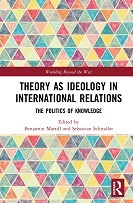 Sebastian Schindler and Benjamin Martill (eds:2020): Theory as Ideology in International Relations
Sebastian Schindler and Benjamin Martill (eds:2020): Theory as Ideology in International Relations
The Politics of Knowledge
Are theoretical tools nothing but political weapons? How can the two be distinguished from each other? What is the ideological role of theories like liberalism, neoliberalism, or democratic theory? And how can we study the theories of actors from outside the academic world? This book examines these and related questions at the nexus of theory and ideology in International Relations. The current crisis of politics made it abundantly clear that theory is not merely an impartial and neutral academic tool, but instead implicated in political struggles. However, it is also clear that it is insufficient to view theory merely as a political weapon. This book brings together contributions from a number of different scholarly perspectives to engage with these problems. The contributors, drawn from various fields of International Relations and political science, cast new light on the ever problematic relationship between theory and ideology. They analyze the ideological underpinnings of existing academic theories, and examine the theories of non-academic actors such as staff members of international organizations, ecovillagers, and liberal politicians. This edited volume is a must-read for all those interested in the contemporary political crisis and its relation to theories of International Relations.
Sebastian Schindler (eds: 2020) The task of critique in the times of post-truth. Forthcoming in the Review of International Studies.
The critical study of ideology, knowledge and power is confronted with a peculiar problem. The problem is that the relativization of facts – the claim that knowledge is merely the product of power, history, and perspective – is a core aspect of ideological thinking today. This article discusses the implications of this problem for critique in the contemporary times. I argue that the focus on criticizing naturalization has led to a radicalization of (relativizing) critique. I show that relativization is a core feature not only of so-called ‘post-truth politics’, but also of 20th century ideologies. I claim that relativization is combined with naturalization, and that both relativization and naturalization, both cynical disbelief and naïve belief, are integral aspects of one and the same ideology. Our task is to come to terms with the nature of this ideology and to use its critique to orient our struggle for emancipation.
Sebastian Schindler 2019. “Trump und das Post-Faktische: Die tieferen Ursachen eines nur scheinbar skeptischen Umgangs mit der Wahrheit“, Angriff auf die liberale Weltordnung: U.S. Außen- und Sicherheitspolitik unter Trump, hrsg. von Christopher Daase und Stefan Kroll, Wiesbaden: Springer VS, 59-76.
Die Regierung unter Donald Trump mischt die internationale Politik auf. Dabei stellt sie internationale Normen ebenso in Frage wie etablierte Beziehungen und Organisationen. Nicht wenige sehen hierin einen Angriff auf die liberale Weltordnung. Die Beiträge dieses Bandes nehmen die Außen- und Sicherheitspolitik der Trump-Regierung zum Ausgangspunkt, um näher zu bestimmen, welche Prinzipien diese Ordnung ausmachen und inwieweit sie durch die gegenwärtige amerikanische Politik beeinträchtigt werden. Fokussiert wird dabei sowohl auf den Akteur Trump, den Twitter-Provokateur und Narzissten, als auch auf die etablierten Strukturen, die durch die aktuelle Politik verschoben werden, die diese aber auch zu begrenzen vermögen. Der Band zeichnet ein differenziertes Bild von Trumps Präsidentschaft, ohne dabei die tiefer liegenden Gefahren zu relativieren.
 Sebastian Schindler, Benjamin Braun, and Tobias Wille 2019: Rethinking agency in International Relations: performativity, performances and actor-networks. In: Journal of International Relations and Development,Volume 22, Issue 4, pp 787–807.
Sebastian Schindler, Benjamin Braun, and Tobias Wille 2019: Rethinking agency in International Relations: performativity, performances and actor-networks. In: Journal of International Relations and Development,Volume 22, Issue 4, pp 787–807.
The academic discipline of International Relations (IR) has long pondered the questions of what it means to act in international politics and who can do so. However, the particular way in which IR has approached the problem of agency has somewhat masked important dynamics in international politics. By approaching the question of agency as an analytical problem that needs to be resolved before engaging with empirical material, IR has failed to see that who can act is often uncertain and contested. This special issue examines the emergence of international agency as an empirical phenomenon. Rather than analysing what given agents do, the contributions study how practices, performances and networks create and transform agency. In this introductory article, we prepare the ground for this distinct approach to studying international politics. We review how IR has addressed the problem of agency, and we discuss three social–theoretical traditions that see agency as an emergent phenomenon: poststructuralism, performance studies and actor-network theory. Finally, we highlight four insights that emerge from the contributions and challenge how IR has traditionally imagined agency.
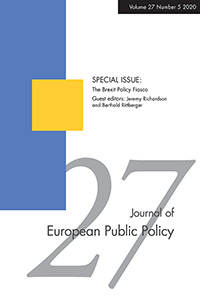 Tim Heinkelmann-Wild, Lisa Kriegmair, Berthold Rittberger und Bernhard Zangl 2019: Divided they fail: The politics of wedge issues and Brexit. In: Journal of European Public Policy. https://doi.org/10.1080/13501763.2019.1683058
Tim Heinkelmann-Wild, Lisa Kriegmair, Berthold Rittberger und Bernhard Zangl 2019: Divided they fail: The politics of wedge issues and Brexit. In: Journal of European Public Policy. https://doi.org/10.1080/13501763.2019.1683058
This paper develops a theory of wedge issue politics in modern democracies. It argues that wedge issues are associated with a politics of intransigence which differs from the politics of concessions that typically comes with non-wedge issues. This theory explains why Prime Minister Theresa May opted for a divisive approach to secure ratification of her Brexit agreement in the House of Commons. Due to the intra-partisan division within the Conservative Party, the government had an incentive to employ politics of intransigence. Playing a chicken game with recalcitrant party members, it relied on bargaining strategies to force party rebels to back down.’ This politics of intransigence further deepened intra-partisan divisions and thus prompted both sides to harden their stance. This vicious circle not onlybrought the Conservative Party to a breaking point but eventually led to government failure.
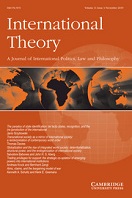 Andreas Kruck und Bernhard Zangl 2019: Trading privileges for support: the strategic co-optation of emerging powers into international institutions. In: International Theory 11, 318-343. https://doi.org/10.1017/S1752971919000101
Andreas Kruck und Bernhard Zangl 2019: Trading privileges for support: the strategic co-optation of emerging powers into international institutions. In: International Theory 11, 318-343. https://doi.org/10.1017/S1752971919000101
As emerging powers rise and established powers decline, international institutions come under pressure to adjust to new power realities. When and how do international institutions adapt to underlying global power shifts? We propose an (institutionalist) theory of strategic co-optation that differs from both (realist) accommodationist and (liberal) integrationist theories. Drawing on isolated treatments of strategic co-optation from other domains – domestic and international, autocratic and democratic, past and present – we develop a theory of strategic co-optation as a mode of institutional adaption to shifts in the global distribution of power. The theory specifies the concept, the conditions and the (unintended) consequences of strategic co-optation. We conceptualize co-optation as a specific form of adaptation where established powers trade institutional privileges for emerging powers' institutional support. We theorize the conditions under which emerging and established powers are (more or less) likely to strike a co-optation deal. In addition, we identify endogenous dynamics that may render co-optation precarious and thus subject to instabilities. While the ambition of this paper is primarily theoretical, we provide various empirical illustrations of how strategic co-optation is used to adapt international institutions to contemporary shifts in the global distribution of power.
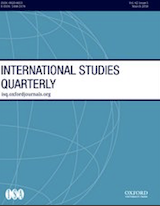 Sebastian Schindler und Tobias Wille 2019: How Can We Criticize International Practices? International Studies Quarterly. https://doi.org/10.1093/isq/sqz057
Sebastian Schindler und Tobias Wille 2019: How Can We Criticize International Practices? International Studies Quarterly. https://doi.org/10.1093/isq/sqz057
In this article, we elaborate two distinct ways of criticizing international practices: social critique and pragmatic critique. Our argument is that these two forms of critique are systematically opposed to each other: They are based on opposing epistemic premises, they are motivated by opposing political concerns, and they pursue opposing visions of social progress. Scholars of International Relations (IR) who want to work with the conceptual tools of practice theory are thus confronted with a consequential choice. Understanding the alternatives can help them to be more self-reflexive in their research practices and intervene more forcefully in contemporary political debates. We illustrate these advantages through a discussion of the scholarly debate on the practices of multilateral diplomacy through which the United Nations Security Council authorized a military intervention in Libya in 2011.
Kenneth W. Abbott, Philipp Genschel, Duncan Snidal und Bernhard Zangl 2019: Competence versus control: The governor's dilemma. In: Regulation and Governance. https://doi.org/10.1111/rego.12234
Most governance is indirect, carried out through intermediaries. Principal–agent theory views indirect governance primarily as a problem of information: the agent has an informational advantage over the principal, which it can exploit to evade principal control. But indirect governance creates a more fundamental problem of power. Competent intermediaries with needed expertise, credibility, legitimacy, and/or operational capacity are inherently difficult to control because the policy benefits they can create (or the trouble they can cause) give them leverage. Conversely, tight governor control constrains intermediaries. The governor thus faces a dilemma: emphasizing control limits intermediary competence and risks policy failure; emphasizing intermediary competence risks control failure. This “governor's dilemma” helps to explain puzzling features of indirect governance: why it is not limited to principal–agent delegation but takes multiple forms; why governors choose forms that appear counterproductive in an informational perspective; and why arrangements are frequently unstable.
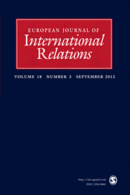 Benjamin Daßler, Andreas Kruck und Bernhard Zangl 2019: Interactions between hard and soft power: The institutional adaptation of international intellectual property protection to global power shifts. In: European Journal of International Relations, 25:2, 588-612. https://doi.org/10.1177/1354066118768871
Benjamin Daßler, Andreas Kruck und Bernhard Zangl 2019: Interactions between hard and soft power: The institutional adaptation of international intellectual property protection to global power shifts. In: European Journal of International Relations, 25:2, 588-612. https://doi.org/10.1177/1354066118768871
Prevailing power transition theories focus on hard sources of power to explain why international institutions do, or do not, adapt to shifts in the balance of power among their members. This article argues that, in the wake of such a shift in the balance between emerging and established powers, institutional adaptations depend on both their hard and soft power resources. Soft power matters for institutional adaptations because both emerging and established powers have to justify the use of hard power to their respective audiences. Whether emerging or established powers are able to use the hard power they have depends crucially on rhetorical resources, such as claims of legitimacy and their (transnational) societal resonance. We provide empirical support for our argument through an analysis of the adaptation of the Trade-Related Aspects of International Property Rights agreement and the adaptation of the Convention on Biological Diversity. Emerging powers such as Brazil, India and South Africa were able to bring about institutional adaptations because they not only had the hard power to undermine the respective institutions, but could also build on civil society support that legitimized their demands or constrained established states’ use of hard power to fend off their demands.
Jenni Brichzin, Sebastian Schindler (2018). „Warum es ein Problem ist, immer ‚hinter‘ die Dinge blicken zu wollen: Wege politischer Erkenntnis jenseits des verschwörungstheoretischen Verdachts“, Leviathan – Berliner Zeitschrift für Sozialwissenschaft 46 (4), 575-602
Both social scientific theories and conspiracy theories claim that they »look behind« the manifold ways in which the world appears to us. Both claim to make the deeper forces and principles that explain what goes on in the world visible. Our article utilizes the metaphor of »looking behind« as a tool of cognition. The problems of this tool are illustrated by our experiences as researchers and with two classic works of social theory, namely Milton Friedman’s »The Methodology of Positive Economics«, and Max Horkheimer and Theodor Adorno’s »Dialectics of Enlightenment«. In all these cases, the metaphor of »looking behind« plays a tremendously important role for knowing the political. Turning to Hannah Arendt and Bruno Latour, we then outline two radically different metaphors of cognition: the valuation of the surface (Arendt) and the mapping of social relations (Latour). While these two alternative figures have some important differences, they both shed light on the genuinely political nature of (human) social affairs - the kind of »politics« that necessarily remains unknown to those who rely on »looking behind«.
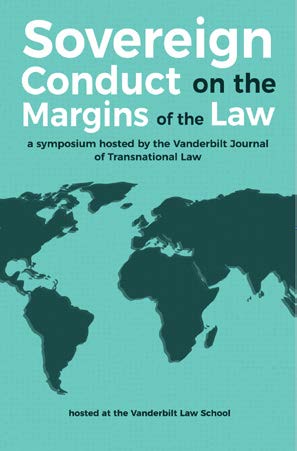
Rainer Hülsse 2017: The Money Mule. Its Discursive Construction and the Implications, in: Vanderbilt Journal of Transnational Law, 50:4.
The proceeds of cybercrime are typically laundered by money mules—people used by criminal organizations to interrupt the financial paper trail by transfering money for the criminals. This Article analyzes the discursive construction of the money mule in documents of national and international anti-money laundering authorities such as Financial Intelligence Units (FIUs), Europol, and the Financial Action Task Force (FATF). It shows how case study narratives, visualizations, and metaphors contribute to an understanding of the money mule as an innocent victim of organized crime networks from West Africa and Eastern Europe, supported by money remittance companies like Western Union. These constructions have several implications: First, they make awareness-raising campaigns the key policy response “at home” (i.e., in countries in the North and West). Second, they imply a policy reaction of playing tough with „sovereigns on the margins of the law“ deemed “abroad” (i.e., countries in the South and East). And third, they direct blame and responsibility towards financial transmitters, but they let banks get away.
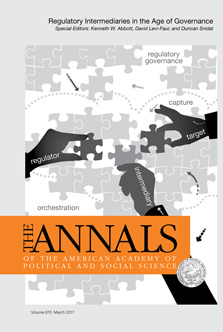 Kruck, Andreas 2017: Asymmetry in Empowering and Disempowering Private Intermediaries: The Case if Credit Rating Agencies, in: The ANNALS of the American Academy of Political and Social Science, 670:1, 133-151.
Kruck, Andreas 2017: Asymmetry in Empowering and Disempowering Private Intermediaries: The Case if Credit Rating Agencies, in: The ANNALS of the American Academy of Political and Social Science, 670:1, 133-151.
This article analyzes the empowerment and disempowerment of credit rating agencies (CRAs) as private regulatory intermediaries. Until the recent financial crisis, regulators heavily relied on private credit ratings to impose risk-sensitive requirements on financial market actors (targets). Regulatory use of credit ratings was instrumental in empowering CRAs because regulatory authority was delegated to them and their own private power was bolstered by public endorsement. But regulators’ subsequent efforts to disempower the CRAs – more recently regarded as dysfunctional “runaway” intermediaries – have proven costly, complicated to do, and hardly consequential in limiting CRAs’ de facto power. This dynamic reveals a path-depent power shift in favor of private intermediaries that is more pronounced (1) the larger the intermediary’s own sources of power when an RIT arrangement is established, (2) the larger the transfer of authority to the intermediary, and (3) the longer regulators rely on the intermediary.
Kruck, Andreas (ed) 2017: Researching Non-State Actors in International Security. Theory and Practice, London: Routledge (mit Andrea Schneiker).
All researchers face the same challenge, not only must they identify a suitable method for analysing their research question, they must also apply it. This volume prepares students and scholars for the key challenges they confront when using social-science methods in their own research. To bridge the gap between knowing methods and actually employing them, the book not only introduces a broad range of interpretive and explanatory methods, it also discusses their practical application. Contributors reflect on how they have used methods, or combinations of methods, such as narrative analysis, interviews, qualitative comparative analysis (QCA), case studies, experiments or participant observation in their own research on non-state actors in international security. Moreover, experts on the relevant methods discuss these applications as well as the merits and limitations of the various methods in use. Research on non-state actors in international security provides ample challenges and opportunities to probe different methodological approaches. It is thus particularly instructive for students and scholars seeking insights on how to best use particular methods for their research projects in International Relations (IR), security studies and neighbouring disciplines. It also offers an innovative laboratory for developing new research techniques and engaging in unconventional combinations of methods.
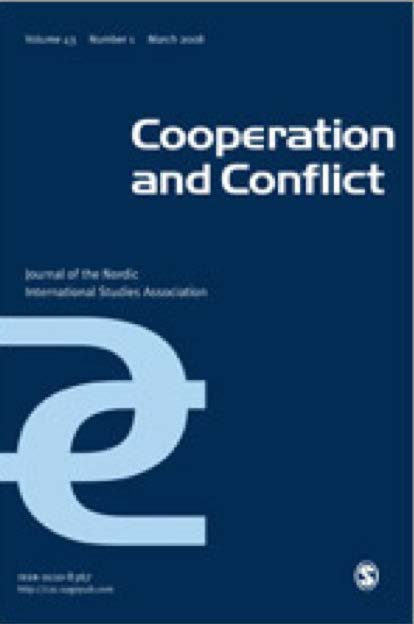 van Meegdenburg, Hilde 2018: ‘We don’t do that’. A Constructivist Perspective on the Use and Non-use of Private Military Contractors by Denmark, in: Cooperation and Conflict.
van Meegdenburg, Hilde 2018: ‘We don’t do that’. A Constructivist Perspective on the Use and Non-use of Private Military Contractors by Denmark, in: Cooperation and Conflict.
In this article I put forward a sociological understanding of Private Military and Security Contractors (PMSCs). I will argue and show that, more than a logical solution to a functional problem, states’ outsourcing decisions and engagements with PMSCs are (co-)shaped by shared values and collective understandings and dispositions. To illustrate this, I take two empirical steps: 1) I provide a detailed overview of the extent of domestic and deployed contracting by the Danish Defence; and 2) based on a number of semi-structured interviews with Danish politicians, civil servants, and officers I highlight two particular understandings (or narratives) that seem to have been most salient, shaping how PMSCs and the option to contract out came to be understood in Denmark. By so doing this article aims to go beyond the often times macro-level and functional arguments in the literature and argues that in Denmark the use of PMSCs remains limited because it is largely perceived as inappropriate and incompatible with what it means to be ‘Danish’. Despite the empirical focus on the single case, the framework put forward offers a perspective on outsourcing decisions by states that is more broadly applicable and opens new avenues for research.
Zangl, Bernhard 2017: Where Does the Buck Stop? Explaining Public Responsibility Attributions in Complex International Institutions, in: Journal of Common Market Studies JCMS, 55:4, 909-924 (mit Berthold Rittberger, Helena Schwarzenbeck).
Bernhard 2017: Where Does the Buck Stop? Explaining Public Responsibility Attributions in Complex International Institutions, in: Journal of Common Market Studies JCMS, 55:4, 909-924 (mit Berthold Rittberger, Helena Schwarzenbeck).
Who is held publicly responsible for the policies of international institutions? Are member states or supranational bodies held responsible or are public responsibility attributions (PRA) untargeted? We argue that in complex policy-making systems responsibility tends to be attributed to implementing actors. When, however, a policy does not require active implementation, we expect responsibility attributions to be untargeted. To test these expectations, we analyze PRA in the European public for three EU migration policies: (1) border control policies, (2) the distribution of refugees according to the Dublin-system, and (3) socalled welfare migration facilitated by the freedom of movement principle. Our analysis corroborates that PRA reflect the structure of policy implementation: (1) PRA for EU border controls target the EU; (2) PRA for the distribution of refugees target member states; (3) PRA for welfare migration are untargeted. The paper thus highlights an accountability gap for policies that do not require implementation.

Kruck, Andreas 2016: Resilient Blunderers: Credit Rating Fiascos and Rating Agencies Institutionalized Status as Private Authorities, in: Journal of European Public Policy, 23:5, 753-770.
The authority of credit rating agencies (CRAs) has been surprisingly resilient even in the face of recurrent, widely recognized and severe rating failures. This contribution analyses why rating fiascos have had little impact on CRAs status as transnational private authorities. This resilience is not only owing to CRAs own (genuinely private) sources of authority. Rather, previous public authorization of CRAs as quasi-regulators and the path-dependent politics of post-fiasco re-regulation have institutionally entrenched and legitimated their status as private authorities. Relying on a historical institutionalist approach and focusing on the regulatory setting of the European Union (EU), the article retraces how flawed public policy choices in the past, i.e., granting CRAs a recognized regulatory role, and non-intended institutional dynamics have spawned later regulatory dilemmas in dealing with CRAs rating fiascos. Thus, CRAs recent mistakes have paradoxically fostered a progressive institutionalization rather than a downgrade of their role as private governors.
Zangl, Bernhard mit Kenneth Abbott, Philipp Genschel und Duncan Snidal (2016)
Two Logics of in direct Governance: Delegation and Orchestration
in: British Journal of Political Science 46:4, 719-729.
This article introduces the concept of orchestration as the mobilization of an intermediary by an orchestrator on a voluntary basis in pursuit of a joint governance goal. Orchestrator-Intermediary theory then provides a model of indirect governance that supplements delegation models premised on principal-agent theory. Under both theories,
governors enhance their governance capacity by drawing on the capabilities of third parties. Whereas delegation is premised on hard ‘contractual’ control over the agent, however, orchestration relies on the soft control of like-minded intermediaries through material and ideational support. The two models overlap, and governors mix them in practice, but distinguishing between them analytically can broaden and deepen analysis of indirect forms of governance. This article discusses the circumstances under which each model provides a better fit fo
r real-world problems, as well as the key limitations of each model. Among other things, orchestration is relatively more likely in democratic than authoritarian systems, when governors have limited direct capacities of their own and when veto players are more numerous. Orchestration is not always more desirable than delegation, but it provides an important alternative in some circumstances. Multiple examples from both domestic and international settings are used to illustrate this claim. The article closes with key considerations regarding the effectiveness and legitimacy of orchestration.
Za ngl, Bernhard/Frederick Heußner/Andreas Kruck/Xenia Lanzendörfer 2016: Imperfect Adaptation: How the WTO and the IMF Adjust to Shifting Power Distributions among their Members, in: The Review of International Organizations, 11:2, 171-196.
ngl, Bernhard/Frederick Heußner/Andreas Kruck/Xenia Lanzendörfer 2016: Imperfect Adaptation: How the WTO and the IMF Adjust to Shifting Power Distributions among their Members, in: The Review of International Organizations, 11:2, 171-196.
How do international institutions adjust to shifting power distributions among their members? We argue that institutional adaptations to the rise of emerging and the decline of established powers are different from what power transition theories (PTTs) would lead us to believe. Institutional adaptations are not impossible, as pessimist PTT variants hold; and they are rarely easy to attain, let alone perfect, as optimist PTT variants imply. To bridge the gap between these versions of PTT, we propose an institutionalist power shift theory (IPST) which combines insights on the conditions and mechanisms of institutional change from functionalist, historical and distributive variants of rational institutionalism. IPST claims that institutional adaptations will succeed or fail depending on whether or not emerging powers are able to undermine the international institution and to make credible threats to this effect. To demonstrate IPSTs plausibility we analyze: (1) how India and Brazil gained the agreement of established powers to their membership in the WTO core negotiation group (Quad), which had previously been dominated by developed countries; and (2) how China reached agreement with established powers on (more) even-handed surveillance of IMF members financial stability, which, up to then, had focused on developing countries and exchange rate issues.
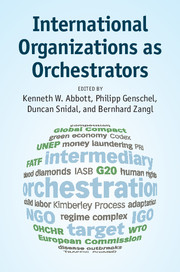 Kenneth Abbott, Philipp Genschel, Duncan Snidal und Bernhard Zangl (eds) 2015:
Kenneth Abbott, Philipp Genschel, Duncan Snidal und Bernhard Zangl (eds) 2015:
International Organizations as Orchestrators
Cambridge: Cambridge University Press
International Organizations as Orchestrators reveals how IOs leverage their limited authority and resources to increase their effectiveness, power, and autonomy from states. By 'orchestrating' intermediaries – including NGOs – IOs can shape and steer global governance without engaging in hard, direct regulation. This volume is organized around a theoretical model that emphasizes voluntary collaboration and support. An outstanding group of scholars investigate the significance of orchestration across key issue areas, including trade, finance, environment and labor, and in leading organizations, including the GEF, G20, WTO, EU, Kimberley Process, UNEP and ILO. The empirical studies find that orchestration is pervasive. They broadly confirm the theoretical hypotheses while providing important new insights, especially that states often welcome IO orchestration as achieving governance without creating strong institutions. This volume changes our understanding of the relationships among IOs, nonstate actors and states in global governance, using a theoretical framework applicable to domestic governance.
 Sebastian Schindler, Tobias Wille (2015). “Change in and through Practice: Pierre Bourdieu, Vincent Pouliot, and the End of the Cold War”, International Theory 7 (2), 330–59.
Sebastian Schindler, Tobias Wille (2015). “Change in and through Practice: Pierre Bourdieu, Vincent Pouliot, and the End of the Cold War”, International Theory 7 (2), 330–59.
The end of the Cold War led to intense debates about how change happens in international politics. In this article, we argue that practice theory has great potential for illuminating this question. Drawing on Vincent Pouliot’s empirical analysis of NATO-Russia relations after the end of the Cold War, we elaborate how change happens in and through practice. We show that post-Cold War security practices are inherently unstable, because there is a fundamental uncertainty about whether the Cold War is really over or whether the Cold War logic of bipolar confrontation still applies. Uncertainty about the meaning of the past destabilizes present practices and thus makes sudden and drastic change possible. To date, many contributions to the literature on international practices have, however, failed to grasp the inherent instability of practice. We argue that this failure is due to a particular conception of change that can be found in the works of Pierre Bourdieu. Through a close reading of Pouliot’s Bourdieusian analysis of post-Cold War politics, we demonstrate the limitations of such a perspective, notably that it is unable to grasp how change originates in practice.
 Zangl, Bernhard mit Christian Kreuder-Sonnen (i.E.)
Zangl, Bernhard mit Christian Kreuder-Sonnen (i.E.)
Which Post-Westphalia? International Organizations between Constitutionalism and Authoritarianism
in: European Journal of International Relations
The most recent transformation of world order is often depicted as a shift from a Westphalian to a post-Westphalian era in which international organizations are becoming increasingly independent sites of authority. This internationalization of authority is often considered as an indication of the constitutionalization of the global legal order. However, this article highlights that international organizations can also exercise authority in an authoritarian fashion that violates the same constitutionalist principles of human rights, democracy, and the rule of law that international organizations are usually expected to promote. It is thus an open question which post-Westphalia we are in fact heading to: a constitutionalized order, an authoritarian order, or a combination of both? Based on a conceptualization of post-Westphalian orders as a two-dimensional continuum linking the ideal-typical end points of constitutionalism and authoritarianism, we analyze the United Nations security system and the European Union economic system as two post-Westphalian orders. While we find a remarkable level of constitutionalization in the European Union and incipient constitutionalist tendencies in the United Nations, we also find authoritarian sub-orders in both institutions. Most visibly, the latter can be discerned in the United Nations Security Council’s counter-terrorism policy after 9/11 and European emergency governance during the sovereign debt crisis. The article thus argues that the emerging post-Westphalian order is characterized by a plurality of fundamentally contradictory (sub-)orders coexisting in parallel.
Sebastian Schindler (2014). “Man versus State: Contested Agency in the United Nations”, Millennium - Journal of International Studies 43 (1), 3-23. (Northedge Prize 2014)
The research on international organisations (IOs) continues to be dominated by two distinctions: on the one hand, the distinction between rational choice and social construction; on the other hand, the distinction between IOs as arenas for states and IOs as actors in their own right. In this article I argue that these two distinctions structure not only our theoretical debates on IOs, but also what our theories aspire to explain: political conflicts in IOs. Through an in-depth study of two debates during a conflict in the world food organisations, I show how the distinctions were used to create lines of dispute. I conclude that research that itself establishes the distinctions on a theoretical basis is unable to grasp what conflict in IOs, since it fixes theoretically what is contested politically. What is called for is instead a practice-theoretical approach.
 Philipp Genschel und Bernhard Zangl (2014): State Transformations in OECD Countries: Towards the State as a Manager of Political Authority
Philipp Genschel und Bernhard Zangl (2014): State Transformations in OECD Countries: Towards the State as a Manager of Political Authority
in: Annual Review of Political Science 17, 2014, 337-354.
Is the state still the basic unit of political authority in OECD countries? International relations scholars discuss whether international institutions undermine or buttress state authority. Students of comparative political economy argue about the extent to which political authority has migrated to private market actors. We inventory and compare the main arguments in both debates. Our findings suggest a different pattern of state transformation than most participants in the debates implicitly assume. The key feature is not a zero-sum shift of political authority to nonstate actors but an unbundling and reconfiguration of authority. The segmental differentiation into largely self-contained national states is overlaid by a functionally differentiated order in which different dimensions of authority are exercised by different state and nonstate actors. The state remains focal, but its role changes from virtual monopolist to manager of political authority.
 Rixen, Thomas und Zangl, Bernhard (2013)
Rixen, Thomas und Zangl, Bernhard (2013)
The Review of International Organizations , 8:3, 363-387
Recent research has noted a trend of increased "politicization" of international politics, i.e., decisions of international institutions are increasingly debated and contested within civil society. What is lacking so far are expanantions for this trend. In this paper we derive four potential explanations and empirically test them. The first two, society-centered, hypotheses focus on the process of socio-economic modernization on the one hand and civil society structures on the other. The second pair of polity-centered hypotheses focuses on the decision-making power of international institutions and on their legitimacy. We measure politicization on the basis of a quantitive content analysis of US quality newspaper articles about four decisions of different international instiutions in the issue area of international taxation. Our finding ist that politicization is driven by the increasing decision making authority of international institutions rather than by the lack of legitimacy of their procedures or the factors emphasized by society-centered approaches.
 Zangl, Bernhard mit Achim Helmedach, Aletta Mondré, Gerald Neubauer, Kerstin Blome und Alexander Kocks (2011)
Zangl, Bernhard mit Achim Helmedach, Aletta Mondré, Gerald Neubauer, Kerstin Blome und Alexander Kocks (2011)
Between Law and Politics: Explaining International Dispute Settlement Behavior
in: European Journal of International Relations, 18:2, 369-4011
Over recent decades a judicialization process of international dispute settlement procedures has taken place. Yet, the judicialization of procedures remains meaningless if the procedures are not used and accepted by disputing states in practice. Prominent theoretical approaches point to different conditions under which this is to be expected. Realism emphasizes the international distribution of power, institutionalism stresses the importance of the institutional design of international dispute settlement procedures, and liberalism points to the domestic institutional setting of the participating states. The article confronts these theoretical expectations with states’ actual dispute settlement behavior in the international trade regime, the United Nations Security Council, the European human rights regime and the regime on the protection of endangered species in the 1970s/80s and 1990s/2000s, respectively. Its main finding is that, compared to realism and liberalism, institutionalism fares better in explaining the judicialization of states’ dispute settlement behavior.
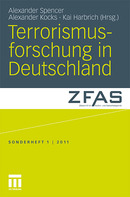 Spencer, Alexander mit Kocks, Alexander und Harbrich, Kai (2011)
Spencer, Alexander mit Kocks, Alexander und Harbrich, Kai (2011)
Terrorismusforschung in Deutschland (Sonderheft der Zeitschrift für Außen- und Sicherheitspolitik)
VS Verlag für Sozialwissenschaften
Die Terrorismusforschung gewinnt als eigenes Forschungsfeld der Politikwissenschaft zunehmend an Bedeutung. Nach dem 11. September 2001 wurden insbesondere im angelsächsischen Teil der Welt unzählige Bücher über das Thema verfasst, Konferenzen organisiert und neben Forschungsprojekten auch eine ganze Reihe von Fachzeitschriften ins Leben gerufen. Auch im deutschsprachigen Raum existiert eine zunehmende Anzahl von Beiträgen zum Thema ‚Terrorismus’, die sowohl traditionell positivistische als auch kritische, konstruktivistische und interdisziplinäre Ansätze verfolgen. Das Sonderheft „Terrorismusforschung in Deutschland“ der Zeitschrift für Außen- und Sicherheitspolitik (ZfAS) liefert in Form einer Bestandsaufnahme einen Überblick über diese unterschiedlichen Forschungsströmungen und beinhaltet nicht nur politikwissenschaftliche Beiträge, sondern auch Forschungsvorhaben anderer benachbarter Disziplinen wie zum Beispiel der Geschichtswissenschaft und dem Völkerrecht.
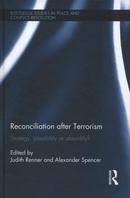 Spencer, Alexander mit Renner, Judith (2011)
Spencer, Alexander mit Renner, Judith (2011)
Reconciliation After Terrorism: Strategy, Possibility or Absurdity? (Routledge Studies in Peace and Conflict Resolution)
Routledge Chapman & Hall
Reconciliation after Terrorism brings together scholars from the hitherto disparate fields of terrorism and reconciliation studies, in order to examine whether reconciliation is a possible strategy for dealing with and ending a terrorist conflict. Although terrorist activities often play a role in situations of conflict and transition, terrorists are generally not taken into consideration as active participants by researchers and practitioners. In some cases, the terrorists turn into political actors during the reconciliation process and their past is not an issue anymore, as it was the case with the ANC in South Africa. This book examines the notion of reconciliation with terrorists from a theoretical and empirical perspective. The notion of engagement and reconciliation with terrorist groups is generally seen as problematic, if not impossible. This is somewhat surprising, given that the idea of societal reconciliation has become a common response to state terror- although not usually in situations of conflict with sub-state terrorist actors. Similar to state terror, sub-state terrorism is a sign of a deep societal rift which reconciliation measures may help to overcome. The text investigates the reconciliatory process further, raising the central questions: (a) what constitutes 'reconciliation' as a process and an outcome; and (b) how can reconciliation be facilitated in a situation of social conflict. This book will be of much interest to students of terrorism studies, transitional justice, conflict resolution, peace and conflict studies and IR in general.
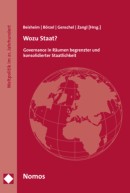 Zangl, Bernhard mit Marianne Beisheim, Tanja A. Börzel und Philipp Genschel (2011)
Zangl, Bernhard mit Marianne Beisheim, Tanja A. Börzel und Philipp Genschel (2011)
Wozu Staat?
Governance in Räumen begrenzter und konsolidierter Staatlichkeit
Baden-Baden: Nomos
Aufbauend auf den Arbeiten der Bremer und Berliner Sonderforschungsbereiche fragt der Band, was der Staat in Räumen konsolidierter und begrenzter Staatlichkeit zu effektiver und legitimer Governance beiträgt: Welche Governance-Leistungen erbringt er in den Politikfeldern Sicherheit, Gesundheit, Umwelt und Finanzmärkte? Welche Governance-Beiträge kommen von nicht-staatlichen Akteuren? Welche Beziehungs- und Konfliktmuster dominieren?
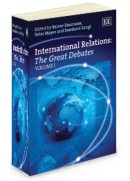 Zangl, Bernhard mit Rainer Baumann und Peter Mayer (2011)
Zangl, Bernhard mit Rainer Baumann und Peter Mayer (2011)
International Relations
The Great Debates
Cheltenham: Edward Elgar Publishing
The history of international relations has been shaped by a sequence of ‘Great Debates’, in which leading scholars of the field advanced, challenged, and defended views about the assumptions that should inform the study of world politics. In this authoritative collection, the editors bring together for the first time the most important contributions to these inspiring intellectual exchanges and provide an excellent overview of the discipline’s development since its inception in the early 20th century. Students and scholars in international relations as well as neighboring disciplines will find these volumes to be an indispensable and highly informative source of reference.
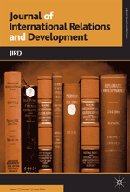 Zangl, Bernhard mit Heupel, Monika (2010)
Zangl, Bernhard mit Heupel, Monika (2010)
On the Transformation of Warefare – A Plausibility Probe of the New War Thesis
in: Journal of International Relations and Development 13, 1, 26-58
This article intends to contribute to the debate on the emergence of so-called new wars by reconstructing the new war thesis in a way that allows an empirical assessment of the plausibility of the thesis. It makes explicit the defining criteria implicit to the new war thesis which claims that a fundamental transformation of modern intra-state warfare has taken place due to the end of the Cold War. It also lays out the causal mechanisms that underpin the alleged transformation of warfare. Based on the reconstructed conceptual framework and drawing on case studies of the wars in Cambodia, Afghanistan, Angola, Somalia and Sierra Leone, the article then lends support to the new war thesis. The cases demonstrate that, in the 1990s, war economies based on criminal activities became more important and triggered the fragmentation of warring parties and the economisation of their war motives. Moreover, in combination, the fragmentation of warring parties and the economisation of their war motives facilitate the application of brutal violence against civilians.
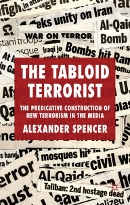 Spencer, Alexander (2010)
Spencer, Alexander (2010)
The Tabloid Terrorist
The Predicative Construction of New Terrorism in the Media
Basingstoke: Palgrave Macmillan
Words matter in Terrorism Research. Not only do they describe reality, but they actively take part in the construction of the world as we see, talk, hear, imagine and ultimately react to it. The Tabloid Terrorist introduces a constructivist approach to the study of terrorism by examining the discursive constitution of the terrorist in tabloid newspapers. It shows how language in the media affects our perceptions of ‘terrorists’ and how particular constructions of the ‘terrorist’ automatically make certain counter-terrorism policies possible, logical and seemingly appropriate.
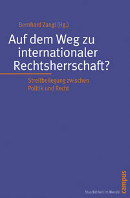 Zangl, Bernhard (Hrsg., 2009)
Zangl, Bernhard (Hrsg., 2009)
Auf dem Weg zu internationaler Rechtsherrschaft?
Streitbeilegung zwischen Politik und Recht
Frankfurt/Main: Campus
Immer mehr internationale Streitigkeiten werden durch gerichtliche oder gerichtsähnliche Instanzen beigelegt. Die klassische Diplomatie verliert zunehmend an Bedeutung. Sind wir auf dem Weg zu einer internationalen Rechtsherrschaft – dem Äquivalent zur nationalen Rechtsstaatlichkeit? Zur Beantwortung dieser Fragen werden zahlreiche grenzüberschreitende Streitigkeiten in der Handels-, Sicherheits-, Umwelt-, Menschenrechts- und Arbeitsschutzpolitik analysiert.
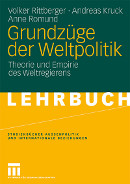 Kruck, Andreas mit Volker Rittberger und Anne Romund (2009)
Kruck, Andreas mit Volker Rittberger und Anne Romund (2009)
Grundzüge der Weltpolitik
Theorie und Empirie des Weltregierens
Wiesbaden: VS-Verlag
Dieses Lehrbuch bietet eine verständliche und umfassende Einführung in die Grundzüge und die Analyse der heutigen Weltpolitik. Es werden die Formen von Weltregieren (Global Governance) in verschiedenen Problemfeldern aufgezeigt, ihr Auftreten erklärt und beschrieben inwiefern sie geeignet erscheinen, heutige transsouveräne Probleme effektiv und legitim zu bearbeiten. Zu diesem Zweck wird eine systematische Untersuchung des Wandels weltpolitischer Rahmenbedingungen und Akteurskonstellationen mit der theoriegeleiteten Analyse der kollektiven Bearbeitung globaler Herausforderungen in den zentralen Feldern 'Sicherheit', 'Wohlfahrt' und 'Herrschaft' verbunden.
 Hülsse, Rainer (2009)
Hülsse, Rainer (2009)
The Catwalk Power
Germany's new foreign image policy
in: Journal of International Relations and Development 12, 293-316
The foreign image policy of states, that is their efforts to influence how they are seen by foreign publics, is an under-researched aspect of International Relations (IR) and Foreign Policy Analysis (FPA). This is wrong, argues this article. As foreign image policy reflects states' self-understandings, its examination provides inside insights into the transformation of states. The analysis of the foreign image policy of Germany brings to light a remarkable transformation.
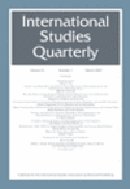 Zangl, Bernhard (2008)
Zangl, Bernhard (2008)
Judicialization Matters!
A Comparison of Dispute Settlement under GATT and the WTO
in: International Studies Quarterly 52:4, 825-854
By analyzing disputes between the United States and the EU under General Agreement on Tariffs and Trade (GATT) and the World Trade Organization (WTO) respectively, the paper demonstrates that the judicialization (or legalization) of international dispute settlement procedures (IDSPs) can contribute to states' compliance with (these) dispute settlement mechanisms. The article compares four sets of pairwise similar disputes which the United States had with the EU: the so-called Domestic International Sales Corporations case (which arose under GATT) and the Foreign Sales Corporations case (which was settled through WTO procedures), the Steel case (GATT) and the Patents case (WTO), the two Hormones cases under GATT and the WTO respectively, the Citrus case (GATT) and the Bananas case (WTO).
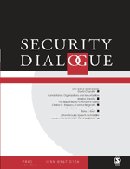 Hülsse, Rainer; Spencer, Alexander (2008)
Hülsse, Rainer; Spencer, Alexander (2008)
The Metaphor of Terror
Terrorism Studies and the Constructivist Turn
in: Security Dialogue 39:6, 571-592
Terrorism studies is fascinated with the terrorist actor. Though this may seem natural, the present article argues that a different perspective can be fruitful. From a constructivist point of view, terrorism is a social construction. The terrorist actor is a product of discourse, and hence discourse is the logical starting point for terrorism research. In particular, it is the discourse of the terrorists' adversaries that constitutes terrorist motivations, strategies, organizational structures and goals. Hence, the article suggests a shift of perspective in terrorism studies — from an actor-centred to a discourse-centred perspective. It develops a discourse approach that emphasizes the crucial role of metaphors in the making of reality. To illustrate this approach, the metaphorical construction of Al-Qaeda in the German popular press in the aftermath of the terrorist attacks in New York and Washington (2001), Madrid (2004) and London (2005) is analysed.
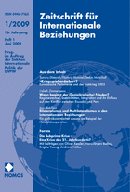 Hanrieder, Tine (2008)
Hanrieder, Tine (2008)
Moralische Argumente in den Internationalen Beziehungen.
Grenzen einer verständigungstheoretischen »Erklärung« moralischer Debatten
in: Zeitschrift für Internationale Beziehungen 15:2, 161-186
Das handlungstheoretische Fundament der Normenforschung wurde in den deutschen IB durch die Habermas-Rezeption erheblich vorangebracht und in der ZIB-Debatte kontrovers diskutiert. Dieser Aufsatz widmet sich einer Reihe bisland vernachlässigter Probleme, die sich aus der Verschärnkung von Handlungstheorie und Moralphilosophie in der Verständigungstheorie internationaler Verhandlungen ergeben.Wo die analytische Trennung zwischen normativer Begründung und empirischer Rekonstruktion aufgehoben wird, drohen nicht nur handlungstheoretische und empirische Verzerrungen, sondern auch eine Preisgabe kritischen Potenzials.


